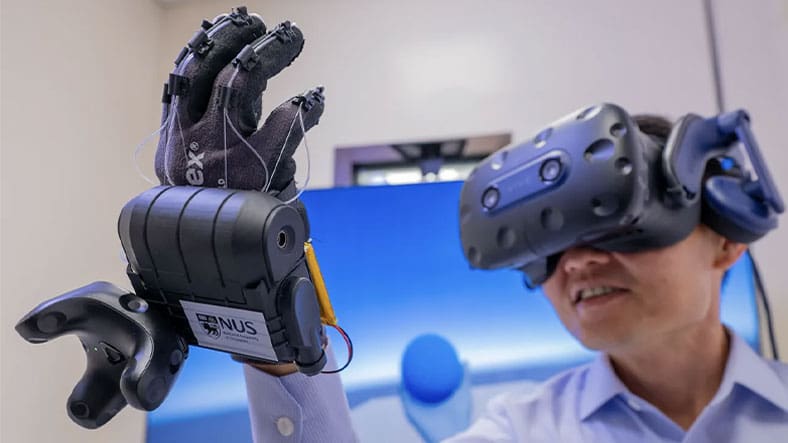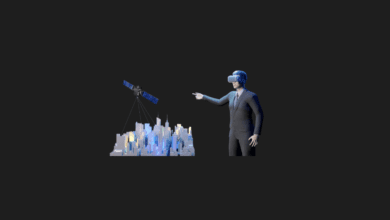Dramatic 90% Drop in Metaverse Land Prices: Industry Giants Reassess Virtual World Investments

The metaverse, a virtual realm that Mark Zuckerberg has heavily invested in, is facing challenges in garnering widespread acceptance. Notable tech giants such as Disney and Microsoft are stepping back from metaverse initiatives, paralleled by a waning interest from users. The market for virtual land within the metaverse has seen a dramatic decrease, with values dropping by as much as 90%.
Over the last two years, the excitement surrounding the metaverse has significantly diminished. Reports from the Wall Street Journal indicate that Walt Disney has dissolved its metaverse strategy team. Similarly, Microsoft has discontinued a social virtual reality platform it acquired back in 2017.
In light of these developments, Mark Zuckerberg has pivoted Facebook, now rebranded as Meta Platforms, towards a renewed focus on artificial intelligence, moving away from an exclusive emphasis on the metaverse.
Metaverse plots have lost 90 percent of their value

The market for virtual real estate in certain digital universes, where users interact through avatars, has experienced a significant downturn. Data from WeMeta, a tracker of metaverse land sales, shows that the average sale price of land in Decentraland has plummeted by nearly 90% from its value a year ago.
The rebranding of Facebook to Meta in October 2021 was a move that captured the initial excitement around the metaverse concept. Mark Zuckerberg, in particular, was a strong proponent of the metaverse’s potential, frequently discussing the future of metaverse experiences, products, and platforms.
Despite these high expectations, the metaverse’s growth has lagged. Factors such as slow user adoption rates and challenging economic conditions have played a role. The necessity for costly hardware and the presence of glitches in the technology have further hindered the anticipated rapid progress and revenue generation from the metaverse.
Metaverse’s time has not come yet

The metaverse, envisioned by tech firms as the forthcoming major platform in computing, is encountering hurdles as these companies resort to layoffs and project cancellations.
Matthew Ball, a venture capitalist and author knowledgeable about the metaverse, observed, “What many people are coming to realize is that this transformation is further off than initially anticipated.”
In a shift of focus, tech companies are trimming their workforce and halting non-essential projects. Mark Zuckerberg, once a vocal advocate for the metaverse as the evolution of the mobile internet, dubbed 2023 the “year of productivity.” However, his company announced the termination of 11,000 employees last fall and plans to eliminate 10,000 positions this month, along with several projects, including its metaverse initiative.
Scott Kessler, a tech industry analyst at Third Bridge Group, noted, “For many companies and businesses, scaling back on such futuristic ventures appears to be a pragmatic choice when looking to reduce headcount or overall expenses.” Kessler also mentioned that investments in artificial intelligence (AI) are showing promise for quicker returns.
He elaborated, “The current focus on AI appears to be yielding practical and exploitable results. In contrast, the metaverse remains a concept with an uncertain timeline, making it difficult for anyone to definitively articulate its future.”
There were also those who were wary at the peak of the Metaverse

The metaverse, envisioned by technology companies as the next significant evolution in computing, is experiencing challenges, including workforce reductions, project cancellations, and user reluctance towards adopting this new technology.
David Limp, Amazon.com’s Senior Vice President of Devices and Services, expressed a different vision at the WSJ’s Future of Everything Festival last year, stating, “I want to focus on technologies that encourage people to look up from their devices — to enjoy the real world.”
Meta, in an effort to boost adoption, reduced the price of its Quest glasses by 33% in early March, following lower than expected sales, which fell short of the company’s optimistic projections.
Since rebranding itself in October 2021 to signal its commitment to developing the metaverse, Meta has invested billions of dollars. However, internal documents reviewed by the Wall Street Journal reveal that its flagship application, Horizon Worlds, has struggled to attract and keep users in the year following its rebranding. Furthermore, the company reported a decline in sales for the Quest 2 virtual reality headsets — essential for accessing Horizon Worlds and other VR applications — in the last quarter.
Metaverse is losing its popularity

Mark Zuckerberg continues to uphold his commitment to the metaverse, albeit with a current shift in focus towards artificial intelligence for the near term. In a declaration last month, Zuckerberg highlighted, “The two significant technological waves shaping our roadmap are artificial intelligence today and the metaverse over the longer term.” Within this address, he referenced artificial intelligence 28 times, in contrast to just 7 mentions of the word “metaverse.
Disney wants to cut costs by $5.5 billion

Walt Disney has discontinued its division dedicated to developing metaverse strategies, as part of a wider reorganization expected to result in 7,000 job cuts over the next two months.
This decision aligns with recent changes in leadership and cost-reduction initiatives within the company. Robert Iger, who reassumed the role of Chief Executive Officer in November, announced plans last month for Disney to eliminate 7,000 positions and reduce expenses by $5.5 billion.
The enthusiasm for virtual real estate has significantly diminished in recent months, leading to a sharp decline in metaverse land sales. Investors who had bought land hoping it would appreciate over time are now witnessing a considerable devaluation of their investments.
Several factors have contributed to this decreased interest, including heightened living costs, the ongoing conflict in Ukraine, and widespread uncertainty about the global economy. Consequently, many are hesitant to invest in what remains a speculative venture.
Despite the current downturn, some still hold a long-term optimistic view of the metaverse’s potential. Yet, whether the metaverse will fulfill its initial promise is an open question.
Iger succeeded Bob Chapek as CEO, who had previously expressed to employees the ambition to “create an entirely new paradigm for how audiences will experience and interact with our stories.”
Microsoft also moved away from the metaverse

Tech giants such as Meta and Microsoft, which previously made substantial investments in the metaverse, are now reducing their commitments as the excitement surrounding the virtual world diminishes.
Meta has found itself in a position where it needed to lower the prices of its Quest VR headsets and dismiss staff within its metaverse division. Similarly, Microsoft decided to close its AltSpaceVR social VR platform and has made changes to the structure of its HoloLens team.
On the other hand, smaller entities in the metaverse space like Decentraland and Sandbox have experienced a downturn in land sales. Data from WeMeta reveals that the average price per square foot in Decentraland has significantly decreased from around $45 a year ago to just $5.
Metaverse Fashion Week sparked the meta universe

Despite the overall decline in engagement within the metaverse, specific online events continue to attract significant attention. Metaverse Fashion Week, featuring brands such as Dolce & Gabbana and Tommy Hilfiger, experienced a rise in attendance this week. This comes even as Decentraland, the hosting platform, witnessed a 25% decrease in active users from November to January, as reported by DCL Metrics, a website monitoring user activity in the digital space.
Venture capitalist and metaverse authority Matthew Ball acknowledges the dip in metaverse interest but argues that this should not be interpreted as a halt in progress. “It’s evident that the metaverse’s buzz is diminishing,” he stated. “However, we shouldn’t view this as a sign of stagnation. The transformation is underway; it’s just not occurring as swiftly as some might hope.”
Ball’s remarks imply that the metaverse is still in the nascent phases of its evolution, suggesting that mainstream acceptance may require more time to materialize. Nevertheless, the popularity of initiatives like Metaverse Fashion Week indicates enduring interest in the metaverse. This enthusiasm underscores the metaverse’s potential to emerge as a significant venue for socializing, entertainment, and business in the future.










